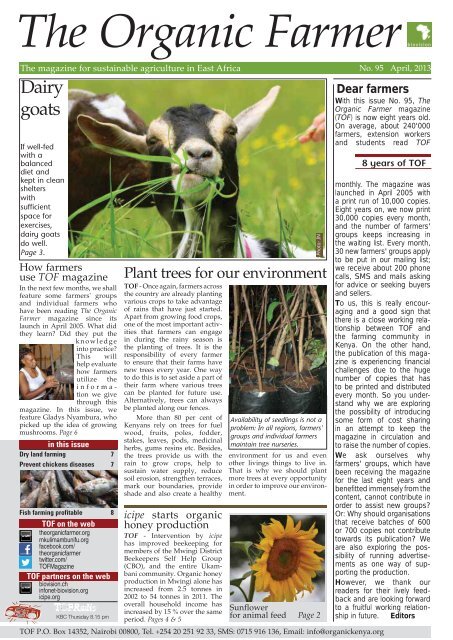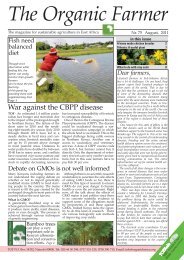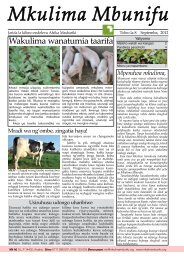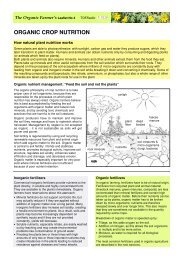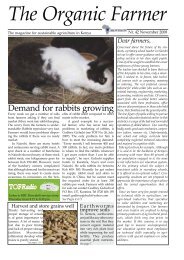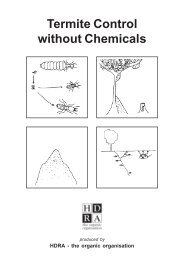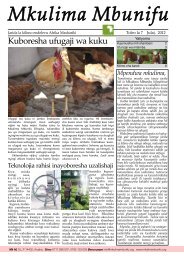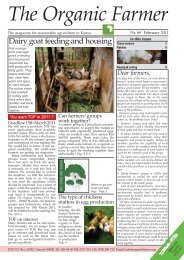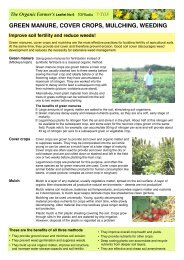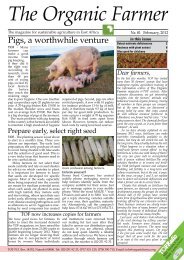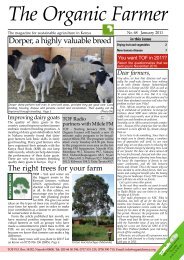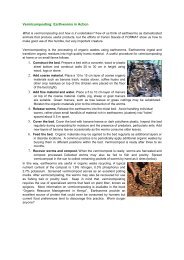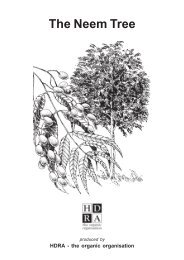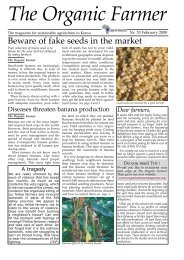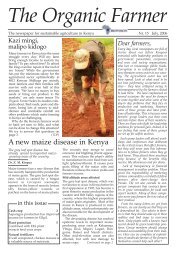TOF, Issue No 95, April 2013 - Infonet-Biovision
TOF, Issue No 95, April 2013 - Infonet-Biovision
TOF, Issue No 95, April 2013 - Infonet-Biovision
Create successful ePaper yourself
Turn your PDF publications into a flip-book with our unique Google optimized e-Paper software.
<strong>No</strong>. <strong>95</strong> <strong>April</strong>, <strong>2013</strong>Feed your dairy goats well to be productiveApart from clean housingand sufficient space, dairygoats require a balanceddiet to remain healthy.Maurice Rangoma Dairygoats are popular with manysmall-scale farmers; the mainreason being that unlike dairycows, they are easy to feed anddo not require a lot of spaceto rear. However, most farmerswith dairy goats do not managethem well, so they cannot behealthy and productive enoughto give good returns in termsof milk and meat. Like allother animals, goats require abalanced diet that has all therequired nutrients such as proteins,carbohydrates (energy)and vitamins to maintain a goodbody condition. Below we givesome important information ongoat feeding which should helpfarmers to keep highly productivedairy goats.Space for a runIn formulating a ration for dairygoats, it is important to note thebest way to feed goats and thatthe rations will be presentedto the animals in the stalls. Butthe goats should have sufficientspace for a run; it is a pity to seehow small the cages of goatsusually are - they are kept likeprisoners!However, there are advantagesof stall-feeding, because:Goats require clean housing to remain healthy and productive.Good feeding enhances the fertility of dairy goatsFeeding during pregnancyDuring the first phase (1 month)the foetus (unborn kid) growsundisturbed. Just feed slightlyabove maintenance.The second phase (2–3 months)is also called mid-pregnancyThe foetus changes slightly. Ifprotein in the feed is low, feedintake will be low resultingin protein deficiency. Proteinrequirements are not high butdeficiency can be detrimental tothe foetus.Third Phase (3–5 months) orlate pregnancy is the most criti-cal stage of the foetus develop-Good feeding is importantas it determines the state ofanimal at maturity, lifetime production,age at maturity andfertility of the animal. Beforeanimals are mated, flushing isdone. About 0.5kg dairy mealis given daily for 2 weeksbefore mating to improve thebody condition. After successfulmating, ade-quatefeed should begiven to avoidembryonicwastage suchas abortion.piece of land for grazing pastures.ucts,banana leaves, maize,maize thinnings, bean husks etc.for feed.do not have to take goats out ofthe shamba for grazing or spendtime looking after them. goats is reduced because theycan be easily looked afterthroughout the day. to plan and managebreeding. crops and damaging the shamba. very easy. and diseases.For female goats, the aim is toattain the earliest age at firstmating. About 7 to 9 months isideal. At this time, the femalesshould be 60% of their matureweight. This will enable milkproduction by the age of oneyear.Provide con-centratesat 300–400grams perdaywhenthey are 3 – 4months old. At6–7 months of agewhen mating timeisapproachingfeed atabout 100–200g perday totrimdownoverfatteningduringCommon dairy goat feedsPasture & Fodderper year with Napier grass or pure stand20 trees per goat.Crops residuesConcentratesalmating.Feeding bucksIncrease feed by 15–20% duringmating. Start introducing concentrates6–7 weeks beforemating at a rate of 200–300g perday. This diet should be continuedup to the 6th or 7th weekafter mating.MineralsMaclick superUnga high phosphorous(powder 20 g per day)Water: At least 8 litres of cleanwater per day.A sample rationDairy goats rations are formulatedfrom roughages mainlysourced from forages, water,minerals and concentrates.They should be fed accordingto body weight and physiologicalrequirements. Dry matteramount is critical in feedingdairy goats. The dry matterrequirement is 6% of the bodyweight.A goat weighing 30 kg willrequire 1.8 kg of dry matter.Here is an example of an idealdaily ration for dairy goat:facts & figures good quality dairy goatcosts Ksh 10,000 to 15,000or even more. An importantaddress for dairy goat farmers:The Dairy Goats Association ofKenya (DGAK) P.O. BOX 1218,Nyeri, dgak@wananchi.com,061 203 10 19ducesbetween 2 and 4 litres ofmilk per day.ment. Although the feed intakeis low good quality feeding isneeded to meet the requirementsof the animal. Underfeeding willresult in low birth weight, lowproduction of colostrum andreduction in milk production.Steaming up is done duringthe last 60 days of pregnancy.This is important for buildingstores for use in early lactation.Feed up to 400–500 grams perday of concentrates.Feeding for LactationProtein is required at around56g digestible crude protein perday for milk synthesis. Energyis the most sensitive nutrientand is required in the diet whichshould be balanced. Mineralsespecially calcium and phosphorousmust be in the ration inlarger amounts than other minerals.Most diets have enoughof vitamins A and D. MRIn the next issue, we will write
We appreciate <strong>TOF</strong> very muchand have been reading the magazinefor many years. Unfortunately,you rarely bring informationon farming in semi-aridareas like Kitui. I really wouldlike to know how to keep thesoil moist. Joshua Musyoka,KituiJoshua, you are right. Franklyspeaking, it is very hard to giveadvice to farmers in regionswhere there is lack of the mostimportant resource in farming:water. There is as well, lackof information and limitedresearch on crops that do wellin dry areas. Kenya, like mostother countries with a combinationof highlands and arid areashas concentrated on the highlandswith high rainfall becausethis is likely to give the quickestand most cost-effective return.According to FAO, there is lackof interest, low research commitmentand the complexitiesof challenges results in a shortageof technology that can beapplied to improve agriculturein semi-arid regions.The building of dams, securingwater catchments and supplyingfarmers with drip irrigationsystems could assist the farmingcommunity in semi-arid areas.Unfortunately, we are not able toinfluence this, but in the comingmonths, <strong>TOF</strong> will publish articlestargeted at farmers in semiaridareas like Kitui.<strong>No</strong>. <strong>95</strong> <strong>April</strong>, <strong>2013</strong>Water conservation is key to dry land farmingDo I need to vaccinate my chickens?In one of your previous magazinesyou wrote that the sapof aloe vera keeps chickens ingood condition and free fromdiseases. Does this mean that Ido not need to vaccinate them?We may not say yes or no, butit depends on the conditionsunder which the birds are kept.We know some farmers whonever vaccinate their chickens.However, they keep the poultryhouse and the chicken run clean;they use neem, diatomite andpyrethrum to fight mites, fleasand other pests. These help tokeep chickens free of diseases.Controlling diseasesExperienced farmers feed theirchickens with green vegetables(hanging bundles of Sukumawikiin the chicken runwhere the birds can pick and eatthe leaves). They also supply thechickens with water twice a daycontaining some drops of aloevera sap and EM1. They alsoHow to keep the soil moistWhere rain is not sufficient,farming strategy must bedirected towards minimizingany loss or wastage of rainfall.If the soil surface is hard andcrusty, the rates of infiltrationare low, leading to high run-offand hence less utilization of therainfall. Surface crusting mayhinder the emergence of seedlings.Deep cracking of soils canlead to increased loss of moistureby evaporation, and to cultivationproblems.This means that the soil shouldbe covered as much as possible,with mulch, compost, grass andeven crop residue. However,farmers are in a dilemma: Theyneed crop residue such as maizestalks for use as animal fodderadd vinegar once every weekto the water to control bloodystool symptoms (at a dosage ofhalf a cup of vinegar for 5 litresof water). When they buy newchicks, they separate them fromthe rest of the flock to ensurethey do not infect the flock withdiseases.or for making compost. But coveringthe soil is the only waythey can reduce soil erosion andevaporation.Using planting pitsAnother way of growing cropssuch as maize, sorghum orNapier grass is the tumbukizamethod. In this method, youdig a hole (60cm x 60cm x 60cmdeep), fill it with compostedmanure and top soil to 40 cm.Plant the seeds and cover thehole with grass or any otherkind of mulch.Of course, digging the holesrequires some labour input andis hard work in areas with drysoil, but at the end, it pays off:The moisture remains longerin the soil, and when it rains,some day-old chicks. It is justas important that you take careof them and that you observethem carefully. On the otherhand, vaccines are not so expensive;losing a flock may costyou much more. We advise youto consult an experienced veterinaryofficer as well for moreinformation.The most importantvaccinationsMarek disease: This vaccinationis usually administered toyoung chicks in the hatchery.Newcastle disease: Usuallyapplied at 2 to 3 weeks, at18 weeks, then after every 6months.Fowl typhoid / Fowlpox:Administer at 8 weeks in highriskareas and at 18th week inlow risk areas.Gumboro disease: Usuallyapplied in drinking water at 4thand the 14th day.the water remains in the hole.During the dry season, you canwater the holes once per weekto keep the crops from drying. method can also bedone by use of trenches insteadof pits, trenches give more foodand fodder.Plant earlyThere are two other basicrequirements for good crop production:Early planting is one ofthem; the other one is choosingfast maturing varieties. KARI/Katumani has developed maize,beans and sorghum varieties,which take three months tomature. The harvest from thesevarieties might be a little bit lesswhen there is drought, but youcan still get some food.Where can I take a sample ofmy soil to be tested? eral soilsamples from the affectedparcel. To do this, select fouror even six spots in the farm;from each spot, dig about ahalf-foot deep hole and takea little of the top soil and alsothe sub soil and mix them well.Go to the other spots and dothe same, ensuring that the soilis well mixed. Finally, mix allthe samples into one sampleweighing about a half or onekilogramme. Put the soil in apaper bag, ready for test ina soil laboratory. Most KARIresearch centres in the countryhave soil test facilities. If youcannot get a KARI centre nearyou with these facilities youcan send your soil sample tothe KARI National AgriculturalLaboratories (KARI-NARL)along Waiyaki way in Nairobiwhose address is given below:K733-00800, Tel 020 4443 376, 020
<strong>No</strong>. <strong>95</strong> <strong>April</strong>, <strong>2013</strong>Angarika at his well managed fish pond in VihigaDiscover value of informationHesbon Angarika hasimproved his incomethrough fish farming.Dominique Jaquemet Afterreading an article in The OrganicFarmer magazine, Hesbon SawiaAngarika in Lyiaduwa, VihigaDistrict, realised that his farmwas suitable for fish farmingand decided to build a fishpond. A permanent river thatpasses next to his farm turnedout to be a great asset.Before he started to do fishfarming, Angarika wanted toknow more about fish farmingthan he had read in <strong>TOF</strong>. Hevisited the local FarmersResource Centre, where heaccessed information from theInfornet-<strong>Biovision</strong> website andother sources about investmentcosts, fish management andpotential markets, where hecould sell the fish.With the help of his neighbours,Angarika constructed apond measuring 15 x 30 metres.It is fed with water through asmall channel from the river.The base of the pond is linedwith lime and ash to preventwater seepage as recommended.Fish managementHe bought about 1000 tilapiaand 30 mudfish fingerlings tostock the pond. One fish fingerlingcosts Ksh 3. To feed the fishhe buys fish feeds in town. 1kgof feed costs Ksh 40. He feedsthe fish daily at the same time,in the morning at 10 am and inthe afternoon at 3 pm. Duringthe first three months, he givesthe fish 1kg of feed per day; inthe fourth and fifth month heincreases this to 3kg and after5th month he feeds them 4kgper day. In addition, he alsogives them greens such as thegallant soldier weed.At around 8 months, he harvestsabout 800 fish. He sells onekilogram at the local market forKsh 150. Before he restocks thepond with young fish, he clearsthe pond and lines its base withlime and ash to waterproof it.As a pioneer fish farmer in hisvillage, he has become the chairmanof a fish farmers group thathas 18 members.Reinvestment into farmWith the first earnings from hisfish farm, he bought a pig anda heifer. With the income fromthe second harvest, he rented anadditional plot to grow fodderfor his cows. He admits that hehas not been able to feed themproperly. He hopes that withproper feeding, they will startto provide him with adequatemilk for domestic use and sale.He has further diversified andalso grows local vegetable suchas terere (amaranthus) and sometissue bananas. He intercropsmaize with soya beans, whichhas improved his maize yieldand solved the problem of strigaweed."High yield and good income""There is renewed interest infish farming in Kenya. Farmersin suitable areas across thecountry are again turning tofish farming as a way of producinghigh quality food, eitherfor their families or for themarket, and as a way of earningextra income".Photo: D. JacquemetQuoted from: A New Guideto Fish Farming in Kenya byCharles C. Ngugi, James R.Bowman, Bethuel O. Omolo,published in 2007. The informativepublication can be downloadedfor free: http://pdacrsp.oregonstate.edu/pubs/featured_titles/Kenya_Manual.pdf0717 551 129 / 0738 390 715Dairy cows wanted: Any oneselling good dairy cows forzero grazing, preferably inSouth rift? Quote price andyour farm location. Pleasecontact Benard KidewFertilised eggs wanted: Iwould like to buy 2 trays offertilised eggs, preferablyKenbro or layers. I stay inNairobi Area. Please contactRobert Muraya.Potatoes for sale: Kisima Farmhas certified potato seed. Weoffer the "Best of the Best" seedpotatoes at competitive prices.Please contact John Kibet on0721 325 269.Dried sukumawiki for sale: Ifyou need dried well packed in polythene paperplease contact CandyObiogumu on 0725 690 778.Rabbits and leeks for sale: Ihave rabbits and leeks for sale.Please contact Kui Seniour.Beans for sale: Please contactBuoga Jared Omondi.Milking machine wanted: Ifsomeone has informationabout where I can get a onebucket milking machine andcost, please contact BasigwaMoses.Land wanted: I need 5 acres ofland for one year lease nearEldoret, Soy or Nzoia Scheme,please contact Erick Ngosia.Fertilised eggs, indigenouschickens wanted: I am lookingfor someone who can supplyKenbro fertilised eggs, preferablyabout 400 or more everyweek. I also require improvedindigenous chicken fromKARI. Please contact AlexanderAlex on 0721 747 719.Dairy goats for sale: Pleasecontact Allan Kango.Rabbits wanted: I need 3, fourmonth old rabbits (1 male and2 females), which should beunrelated Kelvin Kamoni on0710 821 117.Kienyeji eggs wanted: If youcan deliver 50 trays of Kienyejieggs daily, please contactWinnie Ruto on 0786 583 153.Mango seedlings wanted: Ineed grafted mango seedlings.Please contact FavouredEstar Mukoya.Seedlings for sale: KuvitaWelfare S.H.G located at Kutushas Moringa oleifera seedlingsat their tree nursery for sale,please contact the chairman on0724 869 376.Sweet yellow passion fruits forsale: Please contact Mugo Kaniuon 0722 794 144.Aloe vera extract wanted: Pleasecontact Rhoda on 0720 113 412.Broilers for sale: We are sellingmature broilers at Ksh 750 perbird, interested buyers cancontact Catherine Luombo on0728 859 116.Indigenous seedlings for sale:Cypress, grevilllea, casuarina,pine, Kei apple and others.Interested buyers can contactDavid Ambani on 0727 003 932.Ayrshire dam and bullingheifer for sale: The dam peaksat 30kgs/day three months aftercalving. It is pregnant. The breedis from the reputable Sanctuaryfarm, Naivasha and is registeredwith Kenya Stud Book (KSB).The heifer is an offspring ofSabaki (CAIS). The price is Ksh250,000. Please contact MauriceOnyango on alegosiaya@gmail.com or 0723 585 907.Rice for sale: Anyone in needof retail or wholesale supply ofMwea Pishori Rice, get the bestbargains from Ebullient SuppliesLtd. Wholesale at Ksh 120; Retailat Ksh 135. Contact Debbie on0725 913 349 or Wycliffe on 0723669 189.Chickens: Our poultry farmdeals with dual-purpose chickenslike Dorep, Kenbro and ourhybrid named 'tasteyangu'. We sell their chicks aswell as their chicken meat, callFundi Wycliffe on 0720 046 7700720 046 770.Rabbits: For rabbit meat, pleasecall Sungura Kenya, 0734 923776/0721 219 092 (local consumptionand big quantities.Chicks for sale: We have chicksof various chicken breeds forsale to interested farmers. DascoEnterprises on 0719 808 222.what others are doingIn this section we provide our farmerswith additional information about whatother institutions in the field of agriculture(production, marketing etc).icow.co.kespore.cta.intgaia-movement.orgorganiclifestyles.tamu.eduyagrein.blogspot.comlivestockkenya.comfacebook.com/groups/-farmingkenya


